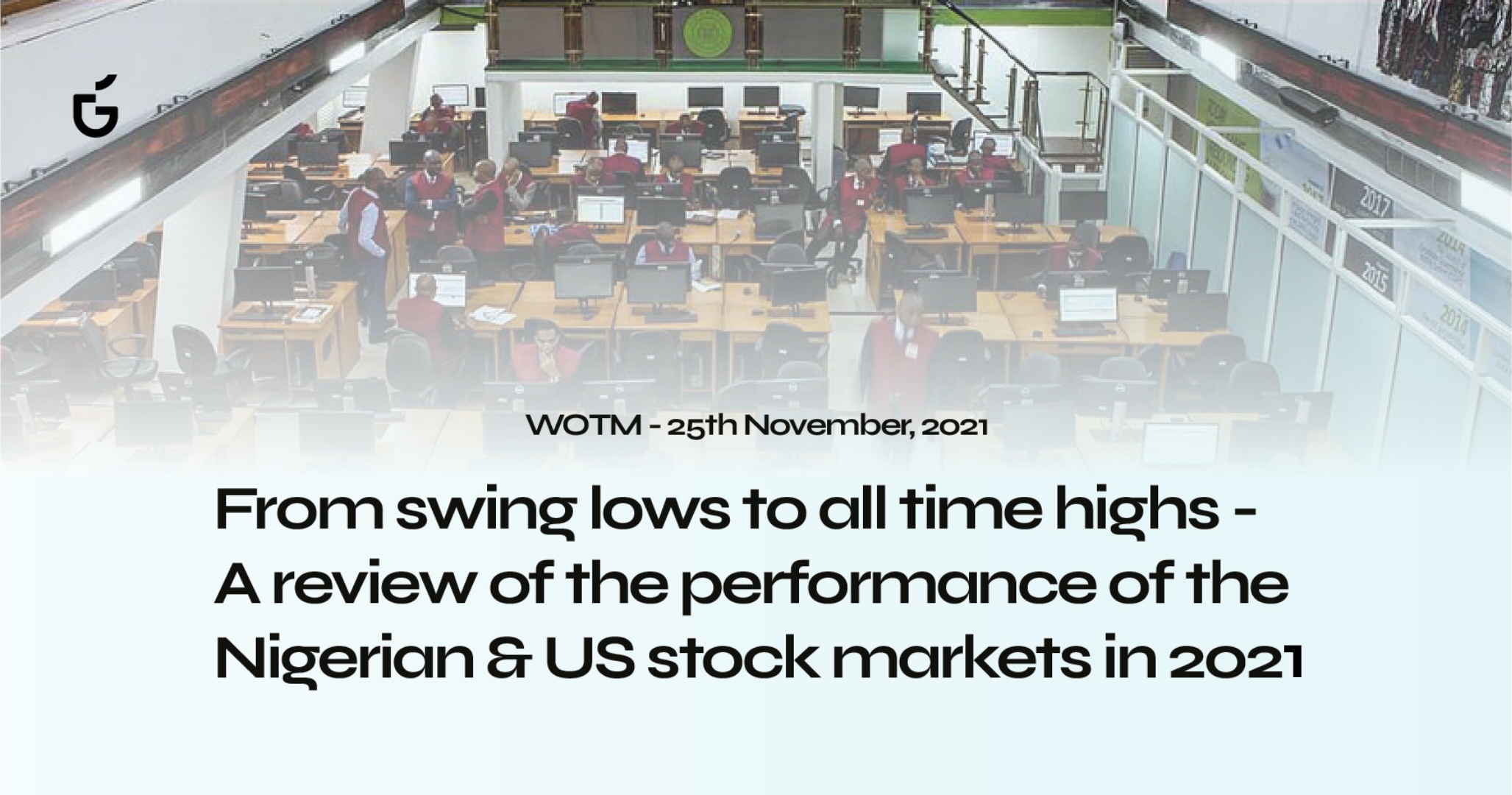 Africa
AfricaUnderstanding how companies are valued – A look into the MainOne acquisition
15 December, 2021
27 May, 2021 | 4 MINS READ
The Story
Wednesday, the 19th of May, 2021 was an ugly day for financial markets around the world. Most stock markets around the world (including the Nigerian Stock Exchange) closed negative.
In the cryptocurrency market, Bitcoin fell 30% while other cryptocurrencies also dropped significantly. The commodities market wasn’t left out of the party as oil prices slipped by $2, silver fell by 1.4%, while gold remained flat.
Why Did This Happen? Let’s Back Track A Bit to See Events Leading Up to This.
Financial markets in Q1 2021 maintained the bullish run (uptrend) that started late 2020. Markets hit a low at the beginning of the pandemic in 2020 and investors swept in to take advantage of valuable assets at record low prices. Financial markets around the world ended 2020 with substantial gains and we saw this spill into 2021. At the beginning of 2021, a lot of analysts thought the trend in the stock market was a bubble but the aggressive vaccination and robust stimulus packages continued to gear on the bullish run in the market.
Q2 2021 is starting to look very different from Q1 2021. For the stock market, the bearish tone (down trend) started towards the end of April when investors began to take profit from the price rise that came with impressive Q1 2021 financials especially from tech companies. This profit taking continued into the first few days of May after which the market picked up again.
For the cryptocurrency market, the dip started in mid-April. Portfolio managers adjusted their portfolios following the significant rise in price of cryptos and the market also began correcting from over bought prices. The crypto market recovered from the decline towards the end of April and started to dip again by the second week of May. This time around, it was because Elon Musk announced Tesla will not accept Bitcoin as a means of payment until the environmental effect of mining Bitcoin was fixed. This saw the price of Bitcoin drop from a little over $59,000 to below $45,000. Shortly after, news broke of Binance (the largest cryptocurrency exchange) being investigated for money laundering. The camel’s back was broken by the banning on financial institutions in China from carrying out cryptocurrency transactions.
This drove panic into the crypto market and we saw Bitcoin fall from a little over $43,000 to below $30,000 within a few trading hours. The panic in the crypto market slipped into other financial markets and so we saw the stock market and some commodities decline.
Is the Dip Over? What Should we Expect Going Forward?
At TGIC research, we believe that the market trends, going forward, is dependent on a number of factors. The Federal Reserve (the central banking authority in America) in a bid to stem the effect of the pandemic on the economy adopted an accommodative monetary policy stance (low interest rates and continuous bond buy backs).
Low interest rates encourage borrowing. If the funds borrowed is invested in the economy, more jobs will be created and this will improve consumer spending, while bond buy-backs literarily pushes money into the economy. The US government also pumped money into the economy with its stimulus packages, almost $5trn was disbursed on stimulus packages for US citizens since the beginning of the pandemic. The Federal Reserve’s accommodative monetary stance and the US government’s robust stimulus package have inflationary tendencies.
After the market crash of 2008, the Federal Reserve adopted a loose monetary policy; interest rates were kept low and quantitative easing was introduced. This was done to stimulate the economy and encourage consumer spending. Economic downturns discourage consumer spending and low consumer spending stifles economic growth, so whenever there seems to be any form of slowdown in economic activities, central banks usually adopt a loose monetary policy stance by dropping interest rates and finding other ways to inject money into the economy. A loose monetary policy stance is supposed to increase the money in circulation and increase inflation. Unfortunately, the Federal Reserve’s loose monetary stance after the market crash in 2008 did not push up inflation. In the US , inflation has been below 2% since 2009. In fact, inflation was negative in 2009. Negative inflation is deflation which is a continuous decline in prices of good and services. Deflation spells doom for any economy and it is tougher to deal with than inflation.
Things are different in 2021, The Federal Reserve’s loose monetary stance together with the US government’s stimulus package is raising inflation above 2%. Inflation rate in the US has grown from 1.4% in January 2021 to 4.2% in April 2021. Typically, central banks react to higher inflation by increasing interest rates and taking on a tight monetary policy stance but this time, the Federal Reserve has said low interest rates and bond buy backs will be maintained until the economy fully recovers from the economic effect of the pandemic which is expected to happen by 2022/2023. Though inflation is increasing, employment numbers are not yet in line with the Federal Reserve’s projections.
It is also important to note that the government’s stimulus package is funded with debt which the government will have to pay back with revenue. To beef up revenue, the Biden led administration announced they plan to increase corporate tax rate to 28% from the current rate of 21%.
Economic policies directly impact the stock market. If the Federal Reserve is worried about inflation and decides to raise interest rates earlier than expected, the stock market will be negatively impacted as higher interest rates lowers company valuation and earnings which in turn lowers share prices. High interest rates and corporate taxes affect the stock market negatively in general.
It is also important to note that besides economic policies, the trends in the US stock market has been positive since it recovered from the 2008 crash. It took a plunge at the start of the pandemic but recovered quickly. With inflation higher than 2% for the first time in years and expectations of higher corporate tax, we might see a major market correction this year.
For the Cryptocurrency market, the future is unclear. There is still a lot of uncertainty surrounding the market. A recent audit of Tether, the most popular stable coin by the New York Attorney General’s office revealed that Tether hid $850mn in losses and didn’t give enough disclosures as to the assets backing the coin. Also, the planned money laundering investigation of Binance and the environmental effects of Bitcoin mining put the market in a bad light.
Though the market is recovering, regulation will come to play and we believe governments around the world in the near future will try to control the cryptocurrency market by creating government coins that will become legal tenders. This, in addition, with the recent negative reports coming out of the cryptocurrency market will influence the direction of the market.
Based on this, what Position Should I Take in the Market Going Forward?
Investing in the US stock market going forward would require that you identify sectors that do well in a high inflation period and invest in viable companies in that sector. For example, companies in the consumer staples sector do well in periods of high inflation.
For cryptocurrencies, Bitcoin seems to be the safe haven in that space. Most institutional investors pitch their tent with Bitcoin and it has the highest market capitalization and volume of trades in the crypto market. So, it might be best to align your investment in the crypto market with the safe haven.
Please note that stocks and cryptocurrencies are high risk assets. It is required that you do your due diligence and research before investing in any of these assets.
Do you know TGIC is now open to new members? Click here to join us to learn about the asset classes you can invest in this season based on our due diligence process.
 Africa
Africa15 December, 2021
 Africa
Africa09 December, 2021
Join the biggest
investment club in Nigeria.